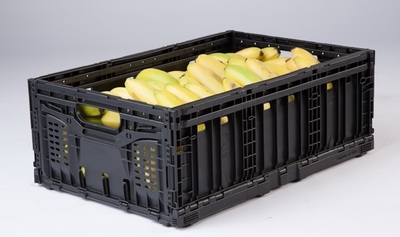Banana industry trials re-usable crate that reduces waste

Recent trials by CHEP Australia in the use of re-usable plastic crates as an alternative to cardboard cartons for the banana industry have returned positive results for growers and other members of the supply chain.
Early estimates show a 10 to 15% cost saving, while also reducing damage to the fruit when using crates compared with cartons.
In early 2015, more than 200 crates were used to pack bananas at a trial site in northern NSW, with wholesaler PW Chew managing transport, ripening and distribution. A combination of Lady Finger and Cavendish bananas were used in the trial. Fruit sizes ranged from 15 kg XL, 13 kg XL and 13 kg large.
PW Chew Operations Manager Mark Bradshaw said the ability to cross-stack crates and the greater crate integrity over cartons are huge bonuses for the banana industry.
“The greater stability that is available in cross-stacking has shown to be of great benefit to the integrity of the bananas. By the time they were ripened for retail, the initial trials indicated that there was less rub marking, bruising due to movement and neck damage in comparison to the same fruit packed in cartons from the same district,” Bradshaw said.

“Cooling and ripening of the fruit was far more efficient too with the crates as you are not cooling the cardboard as well as the fruit. As a result, airflow, temperature and humidity are more consistent around the ripening room, which means we save nearly a day in ripening.”
Pooled solutions provider CHEP Australia has been developing and trialling a re-usable plastic crate in collaboration with the Australian banana industry over the past three years.
The current design features smooth walls and a waved base to minimise damage to bananas, improved ventilation and a footprint to suit Australian pallets with six crates per layer.
The CHEP pooling system also allows for crates to be returned for washing — to an HACCP level if required — giving a hygienic solution for the industry and less overall wastage in cardboard.
CHEP Australia Business Development Manager Nick Jones said, “The trial gave all parties involved an opportunity to learn from each other to find the best packing methodology, supply chain logistics and retail requirements.
“The structural integrity of a plastic crate means that the weight bearing of a stacked pallet is through the crate, not a carton, so it won’t compress.”
Compression damage to fruit from cartons is a major problem for the industry.
Very early on in the trial, it became evident that the use of a slitted liner would be beneficial. The combination of plastic crates and liner bags allow for gases to flow through the bag, giving a more consistent ripening colour.
“From a ripening perspective we found the crates delivered consistent half-colour ripening to levels between stage three and four, compared with cardboard. One retailer commented that if they could have consistent colour at stage 3.5, then they will be able to increase their rate of sales.”

The next phase in the trials of the plastic crates will be to conduct studies in northern Queensland to assess the crate performance over longer distances to the major capital cities.
The next round of trials will commence in September 2015. Any growers or supply chain companies interested in participating are invited to contact Nick Jones on 0426 955 754 or Business Development Manager Gordon Sinclair on 0419 256 431.
Phone: 02 9856 2400
igus E2.1 range with igumid CG LW
The igus E2.1 energy chain series is switching to the recycled material known as igumid CG LW,...
Vertiv CoolLoop Trim Cooler
The Vertiv CoolLoop Trim Cooler is designed to operate with fluctuating water temperatures...
Ecoforest heat pumps
Suitable for a wide range of building sizes and applications, Ecoforest heat pumps offer scalable...







